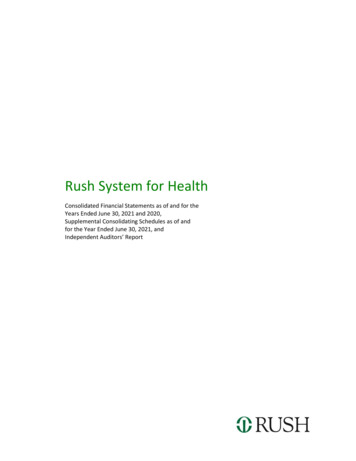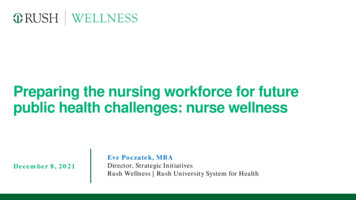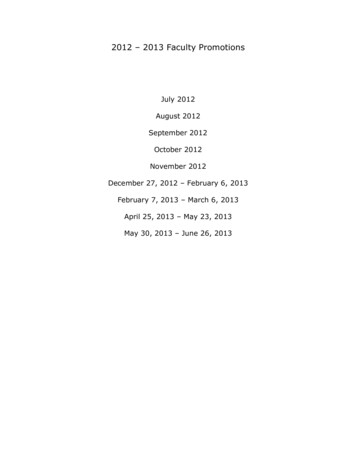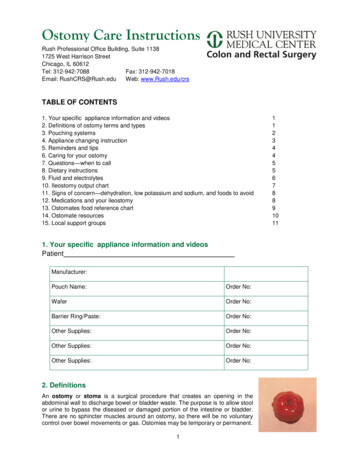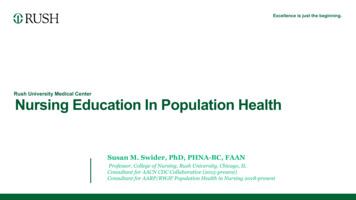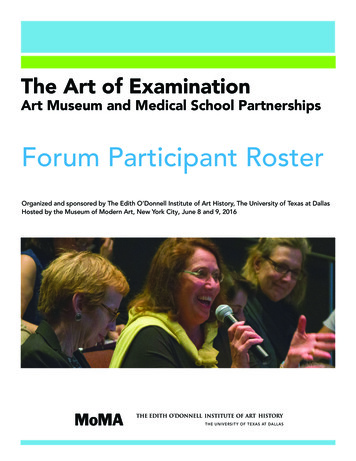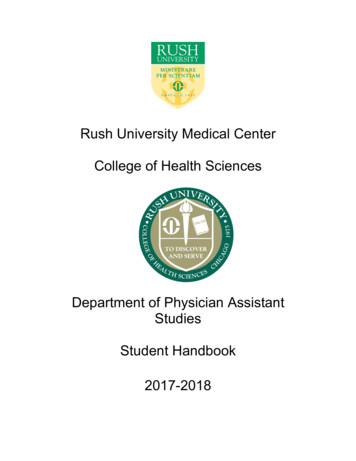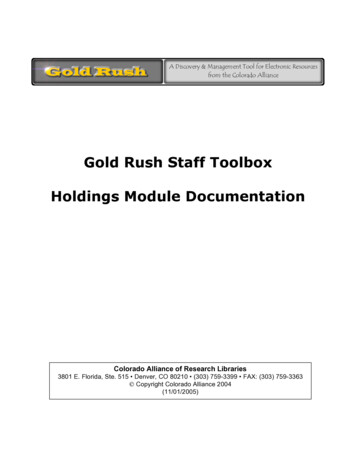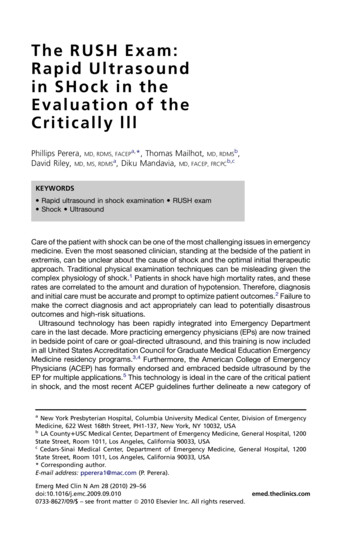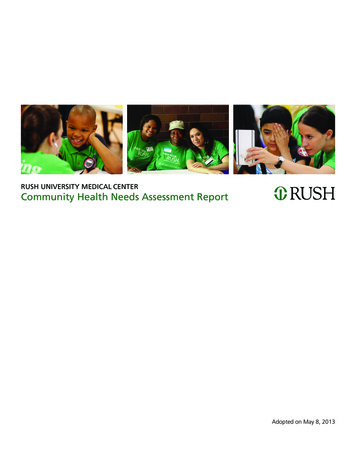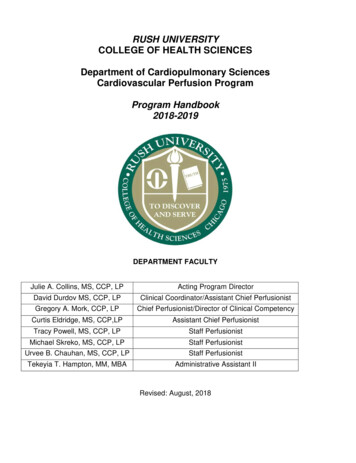
Transcription
RUSH UNIVERSITYCOLLEGE OF HEALTH SCIENCESDepartment of Cardiopulmonary SciencesCardiovascular Perfusion ProgramProgram Handbook2018-2019DEPARTMENT FACULTYJulie A. Collins, MS, CCP, LPActing Program DirectorDavid Durdov MS, CCP, LPClinical Coordinator/Assistant Chief PerfusionistGregory A. Mork, CCP, LPChief Perfusionist/Director of Clinical CompetencyCurtis Eldridge, MS, CCP,LPAssistant Chief PerfusionistTracy Powell, MS, CCP, LPStaff PerfusionistMichael Skreko, MS, CCP, LPUrvee B. Chauhan, MS, CCP, LPStaff PerfusionistStaff PerfusionistTekeyia T. Hampton, MM, MBAAdministrative Assistant IIRevised: August, 2018
Cardiovascular Perfusion Program HandbookGraduating classes 2018-2019CLINICAL AFFILIATESBarnes Jewish1 Barnes-Jewish Hospital PlazaSt. Louis, Missouri 63110(314) 362-3767Beth Israel Deaconess Medical Center330 Brookline AvenueBoston, MA 02215(617) 667-7000Geisinger Medical Center100 N. Academy Ave.Danville, PA 17822(570) 271-6211Hospital of the University of Pennsylvania3400 Spruce StreetPhiladelphia, PA 19104(215) 662-3227IU Health SystemI-65 21st StreetIndianapolis, Indiana 46206(317) 962-2000Loyola Medical Center2160 South First AvenueMaywood, Illinois 60153(708) 216-4209Lurie Children’s Hospital225 East ChicagoChicago, Illinois 60611(312) 227-4000Lutheran Hospital of Indiana7950 W. Jefferson Blvd.Fort Wayne, Indiana 4680(260) 435-7001Mayo Clinic201 West Center StreetRochester, Minnesota 55902(507) 266-7890Mercy Hospital and Medical Center2525 S. Michigan AvenueChicago, IL 60616(312) 567-2000Mosaic Life Center5325 Faraon St.St. Joseph, Missouri 64506(816) 271-6000New York Presbyterian525 East 68th StreetNew York, New York 10032(212) 305-8085Northwestern University Medical Center251 E. Huron StreetChicago, Illinois 60613(312) 926-9697Ochsner Clinic Foundation1514 Jefferson HighwayNew Orleans, Louisiana 70121(504) 842-3000OSF St. Francis530 N.E. Glen Oak AvenuePeoria, Illinois 61637(309) 781-4717Specialty Care Cardiovascular Resources3100 West End AvenueNashville, TN 37203(615) 345-5400Spectrum Health100 Michigan StreetGrand Rapids, Michigan 49503(616) 391-1774St. John Providence Health System28000 DequindreWarren, Michigan 48092(313) 343-3058St. John’s Springfield800 E. Carpenter StreetSpringfield, Illinois 62769(217) 544-6464Stroger Cook County1901 W. Harrison StreetChicago, IL 60612(312) 864-6000Thedacare Regional Medical Center1818 N. Meade StreetAppleton, Wisconsin 54911(402) 203-5912University of Cleveland- Harrington11100 Euclid AvenueCleveland, Ohio 44106(216) 844-22732
Cardiovascular Perfusion Program HandbookGraduating classes 2018-2019RUSH UNIVERSITYCOLLEGE OF HEALTH SCIENCESCARDIOVASCULAR PERFUSION PROGRAMTABLE OF CONTENTSEDUCATIONAL PHILOSOPHY .5MISSION OF RUSH UNIVERSITY MEDICAL CENTER . .5RUSH UNIVERSITY VISION . . .5COLLEGE OF HEALTH SCIENCES MISSION . . 5COLLEGE OF HEALTH SCIENCES VISION . . . 5DEPARTMENT OF CARDIOPULMONARY SCIENCES MISSION & VISION . .6CARDIOVASCULAR GOALS & OBJECTIVES .6STUDENT LEARNING OUTCOMES . 7ACCREDITATION . 9CLASS AND CLINICAL HOURS 9PROGRAM OF STUDY/COURSE DESCRIPTIONS .10DAYS OFF AND ABSENCES . 14COMPREHENSIVE END-OF-PROGRAM COMPETENCY ASSESSMENT EXAMINATION .14CONDUCT AND ETHICS .15SCHOLASTIC DISHONESTY AND CHEATING .16EXAMINATION ADMINISTRATION 17EXAMINATION REVIEW .17COLLEGE OF HEALTH SCIENCES PERFUSION TECHNOLOGY PROGRAM: STUDENT ACADEMICAPPEAL & GRIEVANCE PROCEDURES . .18APPEALS PROCESS .20CONDUCT IN CLINICAL FACILITIES 20CHS: HIPAA & PATIENT PRIVACY 20GUIDE TO PROFESSIONAL CONDUCT .21PROCEDURE FOR UNPROFESSIONAL CONDUCT .21INCIDENTS IN THE CLINICAL AGENCY .22PROCEDURE FOR READMISSION TO THE PERFUSION TECHNOLOGY PROGRAM 22CHANGE OF ADDRESS RESPONSIBILITY . 23CORRESPONDENCE BETWEEN STUDENTS AND FACULTY .23RELEASE OF STUDENT INFORMATION .23UNIFORM POLICY FOR CLINICAL PRACTICE .23BACKGROUND TO CLINICAL EDUCATION 24PHILOSOPHY TO CLINICAL EDUCATION . .24STUDENT ROLE IN CLINICAL EDUCATION .24DEVELOPMENT & MEASUREMENT OF CLINICAL SKILLS . .25FEEDBACK ON CLINICAL PERFORMANCE .25FORMATIVE ASSESSMENT OF CLINICAL COMPETENCY .26GRADING GUIDELINES FOR CLINCAL EXPERIENCE COURSES II-III . .26PERFUSION PRACTICUM CASE REQUIREMENTS . 30DAYS OFF & ABSENCES .30STUDENT RESPONSIBILITY PRIOR TO EACH AFFILIATION .31DAILY SCHEDULE DURING THE CLINICAL AFFILIATION . .31DRESS CODE . .32SOCIAL MEDIA & PROFESSIONAL CONSIDERATIONS . .333
Cardiovascular Perfusion Program HandbookGraduating classes 2018-2019ORIENTATION TO CLINICAL SITE 33CANCELLATIONS OF AFFILIATIONS .33PROFESSIONAL EXPECTATIONS . .34CLINICAL REMEDIATION . .35STUDENT-CLINICAL INSTRUCTOR PROBLEM-SOLVING PROCEDURES 35STUDENT’S EVALUATION OF LEARNING & INSTRUCTION .36TECHNOLOGY SUPPORT RESOURCES 37STUDENT EMPLOYMENT DURING PROGRAM 37IMMUNIZATION & TUBERCULOSIS TESTING . 38PROFESSIONAL LIABILITY INSURANCE 38ILLNESS OR INJURY OF STUDENT WHILE ATTENDING CLASSES 39USE OF HOSPITAL LIBRARIES . 39RUSH UNIVERSITY MEDICAL CENTER HR POLICY & PROCEDURES .39RUSH UNIVERSITY POLICIES AND PROCEDURES FOR STUDENTS WITH DISABILITIES .40COUNSELING & ADVISING . 41STUDENT INFORMATION . . 42STUDENT PROFESSIONAL AND COMMUNITY SERVICE REQUIREMENT 43RUSH UNIVERSITY CHS ORGANIZATIONAL CHART .46APPENDIX A . 47APPENDIX B .57APPENDIX C .61APPENDIX D .6334
Cardiovascular Perfusion Program HandbookGraduating classes 2018-2019Rush University College of Health SciencesDepartment of Cardiopulmonary SciencesMaster of Science in Cardiovascular PerfusionEDUCATIONAL PHILOSOPHYThe Cardiovascular Perfusion Program prepares professionals with skills to effectively operate asperfusionists within the complex, challenging, and changing health care environment. The learning withinthe Cardiovascular Perfusion Program is driven by the core beliefs that it is essential for Perfusionist todemonstrate expert problem solving skills, critical thinking skills, positive attitudes toward professionalinvolvement and continuing education and to be adept in the use of evidence based practice. TheCardiovascular Perfusion Program curriculum is based on a comprehensive science foundation,integration of patient care, and fostering clinical decision-making skills. The Cardiovascular PerfusionProgram learning experience will instill a commitment to lifelong learning as a means by which graduatescan deal with and influence the direction of change in the profession.The Perfusion Technology program is dedicated to the mission, vision, and values of the College,University, and Medical Center.MISSION OF RUSH UNIVERSITY MEDICAL CENTERThe mission of Rush is to improve the health of the individuals and diverse communities we servethrough the integration of outstanding patient care, education, research and community partnerships.RUSH UNIVERSITY VISIONRush will be the leading academic health system in the region and nationally recognized fortransforming health care.COLLEGE OF HEALTH SCIENCES MISSIONThe Mission of the College of Health Sciences is to advance the quality and availability of health carethrough excellence in education, research and scholarship, service and patient care. The collegepromotes the values of diversity, access and inclusion in all of its endeavors.COLLEGE OF HEALTH SCIENCES VISIONThe College of Health Sciences at Rush University will be a world-class school of allied health scienceswhose programs are recognized as among the best in the United States.5
Cardiovascular Perfusion Program HandbookGraduating classes 2018-2019DEPARTMENT OF CARDIOPULMONARY SCIENCESDIVISION OF CARDIOVASCULAR PERFUSIONMission StatementThe mission of the Cardiovascular Perfusion Program is to prepare competent entry- levelperfusionists with the knowledge, skills, and disposition to effectively carry out the responsibilities ofthe profession. The program provides an experiential learning platform that prepares graduates to actas skillful professionals who demonstrate critical thinking, multi-disciplinary collaboration, researchexpertise and commitment, professional awareness, and leadership in alignment with the values ofRush University.Vision StatementThe Cardiovascular Perfusion Program will be recognized as a program providing the highest qualitycurriculum whose graduates serve as professionals who are innovative, research-driven, experts inthe field.CARDIOVASCULAR PERFUSION PROGRAM GOAL AND OBJECTIVESEntry level program goals/objectives: Graduates of the program will be prepared to function as acompetent entry level practioneer in the cognitive (knowledge), psychomotor (skills) and affective(behavior) learning domains.Standards:a. Upon completion of the program, all students will demonstrate the ability to comprehend, applyand evaluate information relevant to the role of the cardiovascular perfusionist.b. Upon completion of the program, all students will demonstrate technical proficiency in the skillsnecessary to fulfill the role of a cardiovascular perfusionist.c. Upon completion of the program, all students will demonstrate personal behaviors consistentwith professional and employer expectations for the cardiovascular perfusion practioneer.In addition to these competency goals, the program seeks to develop graduates who can:Advance Clinical Practice Demonstrate critical thinking to improve patient outcomes. Collaborate with multidisciplinary teams in the management of patients requiringmechanical circulatory assist devices. Optimize patient care by employing multiple blood management strategies duringcardiopulmonary bypass procedures.Leadership6
Cardiovascular Perfusion Program HandbookGraduating classes 2018-2019 Plan, organize, and deliver high quality, cost-effective health care services. Commitment to lifelong learning and a strong sense of service. Participate in professional organizations.Teach Demonstrate effective clinical education strategies. Describe and apply common theories associated with clinical education and behavioralchange.Research Formulate appropriate questions, organize and test hypotheses, interpret researchresults, and summarize findings. Critique evidence and apply findings to the practice of cardiovascular perfusion.Demonstrate Professionalism Demonstrate professional spoken and written communication appropriate for theprofession. Demonstrate ability to work as a team member. Demonstrate Rush ICARE values in interactions with patients, students, faculty, andhealthcare team. Demonstrate confidentiality related to protected health information.Student Learning Outcomes:The student learning outcomes are aligned with the 12 required units of learning which align with thestandards and guidelines for Perfusion Programs. These learning outcomes provide what learners willbe able to know and do as a result of the course of study in the program.Knowledge:1. Demonstrate knowledge and skill in basic science concepts including the following areas ofconcentration:a. Cardiovascular Anatomyb. Pathology and Surgical Repairc. Physiologyd. Pharmacologye. Physicsf. Chemistryg. Mathematics7
Cardiovascular Perfusion Program HandbookGraduating classes 2018-2019h. ImmunologySkills and Experiences:2. Apply concepts and skills to effectively use the technology, equipment, and techniques used incardiopulmonary bypass including skills in applying:a. Extracorporeal Circuit Components for Cardiopulmonary Bypassb. Cardiopulmonary Bypass Techniquesc. Adequacy of Perfusiond. Myocardial Preservatione. Systemic Hypothermiaf. Blood Conservation Techniquesg. Special Considerations in Perfusionh. Catastrophe Managementi. Adjunctive Techniquesj. Patient Monitoringk. Organ Transplantation3. Demonstrate proficiency in Mechanical Assist Techniques including skills in:a. Extracorporeal Life Support Techniquesb. Intra-Aortic Balloon Pumping (IABP)c. Ventricular Assist DevicesKnowledge:4. Identify and apply principles of laboratory analysis including analysis in the following areas:a. Special Chemistryb. Blood Chemistryc. CoagulationSkills and Experiences:5. Apply skills in biomedical engineering as it applies to using:a. Biomedical Instrumentationb. Biophysical Transport Phenomenonc. Biomedical Electrical Safetyd. Medical and Diagnostic Imaging Technology6. Demonstrate skills in managing safety in areas of:a. Blood/Fluid Exposureb. Patient SafetyPatient-Centered Care:7. Demonstrate knowledge of continuous quality assurance and CQI for the Perfusionist.8
Cardiovascular Perfusion Program HandbookGraduating classes 2018-20198. Demonstrate understanding of medical ethics.9. Understand the historical development of extracorporeal technology.10. Apply research methods to research in the field.11. Demonstrate understanding of Business Practice and Regulatory Agencies12. Apply knowledge of emergency preparednessACCREDITATIONThe Rush University Perfusion Technology Program is currently on accreditation probation by theAccreditation Committee for Perfusion Education. After graduating from the perfusion program, you willbe qualified to sit for the certification examination of the American Board of Cardiovascular Perfusion.Commission on Accreditation of Allied Health Education Programs25400 US Highway 19 North Suite 158 Clearwater, FL 33763Phone: (727) 210-2350CLASS AND CLINICAL HOURSThe program provides classroom study, laboratory study and observation, clinical experience,independent study, and seminars. Courses are arranged on a set schedule and sequence. Clinicalclasses in area hospitals meet depending on the corresponding shift assignment, or as specified forspecialty rotations. Students are expected to provide their own transportation to clinical training sites.When necessary, the program reserves the right to adjust class schedules, times and programsequencing, to include the possibility of evening classes and clinical, as well as clinical rotations outsideof the Chicago metropolitan area.9
Cardiovascular Perfusion Program HandbookGraduating classes 2018-2019Program of Study for Cardiovascular PerfusionFirst Year Fall Semester (17 SH)CreditHoursCVP 605 Cardiopulmonary Anatomy and PhysiologyThis course provides an introduction to cardiac and pulmonary anatomy, hemodynamicfunction and electrophysiology. Students will focus on gas laws and how they apply both tohuman lung function as well as artificial lung function. In addition, the students will focus onthe anatomy and physiology of the human heart and vascular system. Emphasis is placedon the application of these areas as it applies to cardiovascular surgery and perfusiontechnology.3 SHCHS 601Introduction to Biostatistics ----- IP CourseThis course focuses on concepts and procedures for using descriptive and inferentialstatistics. Differences between parametric and non-parametric statistical tests will beemphasized. This course is predominantly an application based course incorporating theuse of computerized statistical programs such as SPSS.2 SHCVP 611 Cardiovascular Perfusion Technology IThis course introduces the perfusion student to the historical development of both cardiacsurgery and perfusion technology. In addition, the students will learn about the basiccomponents of the heart lung machine and their principles of function. Students will alsolearn the principles of aseptic technique as practiced in the operating rooms and relateddepartments of the hospital.3 SHCVP 612 Instrumentation in Cardiovascular PerfusionThis course introduces the student to the various types of electronic monitoring equipmentrequired for open heart surgery and related procedures. Instructional design includesdidactic presentation of operational theory with practical operating room experience,simulated scenarios and laboratory study. Topics of study include electrical circuitry,pressure transducers, thermistors, cardiac output devices, fluid dynamics and physiologicmonitoring devices.3 SHCVP 620 Evaluation of the Cardiac Surgery PatientThis course introduces the basic diagnostic principles involved in determining the natureand extent of the disease necessitating surgical intervention. Factors that are important indetermining perioperative morbidity and intraoperative perfusion management (e.g. patientmedical history, laboratory results, diagnostic tests, etc.) will be discussed. Course workwill include class time and observations within the clinical arena.3 SHCVP 621 Seminar IThis course is designed to give students a basic understanding of medical terminology,aseptic technique, patient safety issues, professionalism and medical ethics. Students willbe introduced to ethical principles often encountered in the health professions.3 SH10
Cardiovascular Perfusion Program HandbookGraduating classes 2018-2019Program of Study for Cardiovascular PerfusionFirst Year Summer Semester (14 SH)CreditHoursProgram of Study for Cardiovascular PerfusionFirst Year Spring Semester (15 SH)CreditHoursCVP 606 Acid Base PhysiologyThis course provides the perfusion student with a comprehensive review of the structural,functional, and integrative aspects of the kidney and urinary system. The course will focuson theory, application, and interpretation of blood gas analysis and associated clinicalcardiopulmonary physiologic mechanisms that underpin renal function.Pre-Requisite: CVP 6052 SHCVP 615 Cardiovascular Perfusion Technology IIThis course will focus on adult cardiac and thoraco-aortic surgery. Lectures will focus onacquired adult cardiac and aortic disease states and appropriate equipment, circuits andancillary equipment used by the perfusionist. Students will practice perfusion setups andprovide presentations on current perfusion practices related to adult cardiac diseases.Pre-Requisite: CVP 611 & CVP 6123 SHCVP 622 Pathophysiology and Perfusion TechniquesThis course is designed to provide the perfusion student with an opportunity to explore theassociation of anatomy, physiology and pathophysiology and the application of perfusionpractice. The course will provide the detailed foundation and skills necessary to understandthe interplay between the science of extracorporeal technology and the pathophysiologicconsiderations. Identifying and applying these principles in a systematic and integratedmanner is required for evidence-based clinical practice.Pre-Requisite: CVP 611 & CVP 6125 SHCVP 632 Principles of PharmacologyStudents will learn the fundamental principles and concepts of pharmacology. Discussionswill focus on the principles of drug absorption, distribution, and metabolism; drug receptoractivities, and the therapeutic uses and mechanism of action of drugs in each major druggroup.Pre-Requisite: CVP 6203 SHCHS 610 Research MethodsThis course provides an introduction to basic, clinical, and translational researchmethods. It emphasizes the development of skills to enable the health sciencestudent evaluate research articles and participate in clinical researchactivities. Quantitative research designs, sampling techniques, measurement, andinterpretation of common statistical findings are also reviewed. Principles ofevidence-based practice are incorporated.2 SH11
Cardiovascular Perfusion Program HandbookGraduating classes 2018-2019CVP 623 Adult and Pediatric Congenital Heart DiseaseThis course introduces the student to the cardiovascular physiology, pathophysiology andanatomical differences associated with pediatric and adult congenital heart patients.Through lectures and discussion, the students will be prepared to understand thesedefects as well as how a Perfusionist manages the heart lung machine during thesecomplex congenital procedures.Pre-Requisite: CVP 6052 SHCVP 624 Mechanical Circulatory SupportThis course introduces the student to the advance practice guidelines for the care ofpatients treated with cardiac assist devices. Device selection based on patient issues,implantation, operation, and monitoring of various devices will be discussed. Thesedevices, including cell savers, ventricular assist devices, extracorporeal membraneoxygenation, balloon pumps, etc. will be reviewed to give the students an understanding ofthe devices they will be encountering in the field.Pre-Requisite: CVP 6222SHCVP 640 Principles and Practices of Cardiopulmonary Bypass with SimulationThis course prepares the student for their perfusion practicum courses. The principles ofextracorporeal circulation will be presented in lecture and applied during simulation andlaboratory experiences. Students will prepare specific care plans for patient bypassprocedures. Performance standards evaluated include: pre-bypass assessment of thepatient’s hemodynamics and readiness for bypass, the institution and management ofcardiopulmonary bypass, anticoagulation status, system and patient monitoring, as well asprocedural awareness. Each experience will conclude with a de-briefing to allow progressthru the stages of learning.Pre-Requisite: CVP 6224 SHCVP 641 Perfusion Practicum IThis is the first clinical rotation the student will have during their course of study. Thestudents will continue to review the diagnostic work up procedures and apply theirknowledge to develop a perfusion management plan for the patient undergoing cardiacsurgery. The student will begin to assist in the operation and management plan for thepatient. During this rotation students will be tested on competencies required to preparethem for perfusion practicum II through simulation, oral exams and a written exam.Pre-Requisite: CVP 622 & CVP 6324 SHCVP 661 Master’s Project IThe purpose of this course is to provide the perfusion student with the ability to performresearch. The student will be introduced to the concepts of the IRB approval process andlearn how to complete a literature review, collect data, complete a statistical analysis, andwrite a final paper on their research as applicable to their projects. In the CVP 661-662-663course series, students will complete a research project.Pre-Requisite: CHS 601 & CHS 6102 SHProgram of Study for Cardiovascular PerfusionSecond Year Fall Semester (16 SH)CreditHours12
Cardiovascular Perfusion Program HandbookGraduating classes 2018-2019CVP 662 Master’s Project IIThe goal of this course is to integrate qualitative methods with perfusion technologyknowledge and skills to test a hypothesis that addresses a current issue that is important tomanagement of perfusion technology related to health care.Pre-Requisite: CHS 601 & CHS 610 & CVP 6612SHCVP 642 Perfusion Practicum IIThis is the second clinical practicum experience for the student. Each course builds on theskills in the previous clinical and didactic courses. The overarching goal of the practicumseries is that the student shows steady progression towards the goal of independentpractice while under the watchful eye of the clinical instructor.Pre-Requisite: CVP 64112SHCVP 680 Organizational LeadershipThe Organizational Leadership class will focus on the tools and strategies necessary tobecome an effective leader. While the focus will be on how these strategies can be usedwithin a large or small perfusion group their origin is based in effective management andleadership within any organization of any size. Upon completion of this class the studentwill have been exposed to the leadership skills that will prepare them as a future leader inthe profession.2SHProgram of Study for Cardiovascular PerfusionSecond Year Spring Semester (16 SH)CreditHoursCVP 664 Masters Project IIIThis course will focus on completion of the research project for satisfaction of thegraduation requirement. The student will be required to present the progress and findingsof their research.Pre-Requisite: CHS 601 & CHS 610 & CVP 661 & CVP 6622SHCVP 645 Perfusion Practicum IIIThe principal goal of this final practicum experience is that the student will be capable ofperforming perfusion related duties supervised, but without instructor intervention.Pre-Requisite: CVP 641 & CVP 64212SHCVP 681 Health Care Quality & Operations ManagementThe Health Care Quality & Operations Management class is designed to expose thestudent to principles that foster continuous improvement within an organization throughContinuous Quality Improvements (QCI) and Quality Assurance (QA) initiatives. QA hasbecome a mandatory component of every profession in the business of delivering patienthealthcare and it is critical that all future leaders have been exposed to these principles.Upon completion of this course the student will have a solid understanding of how to insureevidence based medicine is being delivered.Pre-Requisite: CVP 6802SHTotal Hours 78Didactic Hours 46Simulation and Practicum Hours 32DAYS OFF AND ABSENCES13
Cardiovascular Perfusion Program HandbookGraduating classes 2018-2019Class attendance is essential to achieve the terminal goals of the program. Class and clinical absencesmust be reported to the Program Director thru email, clinical absences must be reported to the ClinicalCoordinator thru email also, or a delegated person prior to the absence.Students will be granted 5 clinical days off during the clinical year for the purpose of interviews. Studentsare required to notify the Program Director of their intention to use clinical day(s). The notification has tobe in writing (email will count), and should be done at least two weeks prior to taking the days off. In theevent of emergency illnesses, students must notify the Program Director as soon as possible of the needfor day(s) off. Students will provide documentation of the illness as soon as possible. Thisdocumentation must come from an acceptable source (a signed note from a physician). If the studentcannot provide documentation, the student will forfeit two days of clinical days off for every one day thatthe student is absent.Sick time will be deducted from the allotted clinical days off. If a student finds it necessary to take morethan the allotted time off during the clinical semesters, they will be required to make up time duringbreaks or at the end of the final semester. Make up time must be scheduled with the Program Director inadvance.CallSince the goal by the end of the program is for students to function fully as members of the perfusionteam, call is an essential part of that training; thus students may on call at their clinical rotations.Clinical RotationsThe CVP Program is fortunate to have excellent clinical rotations throughout the US. All students arerequired to rotate to some locations outside of the Chicago area and/or to out of state. All costsassociated with these rotations are the responsibility of the student. In addition to the rules andguidelines set forth in this handbook, students must follow any additional rules and regulations requiredby the clinical affiliate.COMPREHENSIVE END-OF-PROGRAM COMPETENCY ASSESSMENT EXAMINATIONPre-Clinical ExamPrior to their clinical rotations students will be administered a written pre-clinical exam. They must receive atleast a 70% on this exam to prior to the start of clinical rotations. Students failing to score 70% or greater onthe exam will receive remediation and retest prior to the start of the clinical rotation. Students not meeting14
Cardiovascular Perfusion Program HandbookGraduating classes 2018-2019the minimum requirement after the retest will be placed on academic probation and will not advance toclinical rotations until the completion of an individual remediation plan.Comprehensive ExamsThree comprehensive exams are taken during the clinical year. One is taken at the beginning of the thirdsemester, one at the end of the third semester and one just prior to graduation. The goals of these tests areto prepare students for the national certifying exam. Each exam consists of questions similar to the boardexams with a time limit. Note paper is supplied and students will only be allowed to bring a non-graphingcalculator and writing utensils. Exams are graded and numerical scores are provided shortly aftersubmission. The Program Director and Clinical Coordinator reviews each test and provides students withareas that need additional concentration.Conduct & EthicsProfessional behavior is expected at all times. Professional attire and appearance is also required at alltimes. Students will have at least one long white lab coat with the RUSH logo (can be purchased frombookstore). Students must display RUSH identification badges at all times.Professionalism: During your clinical education you not only perfect techniques and gain knowledge inclinical perfusion science, but you also develop a professional demeanor that will affect much of yourpublic and priv
RUSH UNIVERSITY . COLLEGE OF HEALTH SCIENCES . Department of Cardiopulmonary Sciences . Cardiovascular Perfusion Program . Program Handbook . 2018-2019 . . Tekeyia T. Hampton, MM, MBA Administrative Assistant II. Revised: August, 2018 . Cardiovascular Perfusion Program Handbook Graduating classes 2018-2019 . CLINICAL AFFILIATES .
